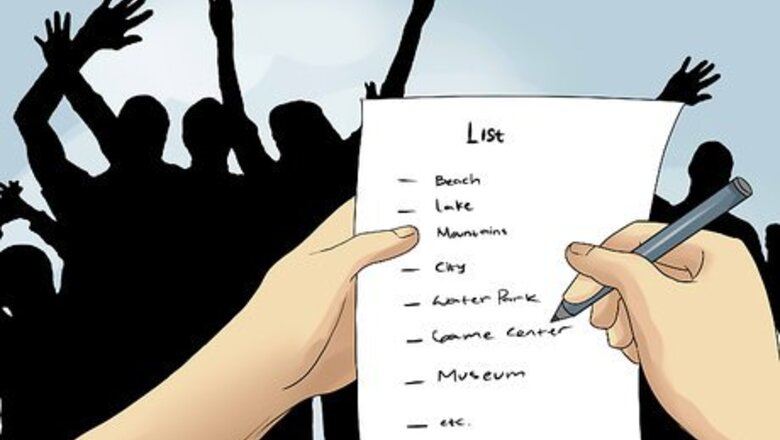
views
X
Trustworthy Source
PubMed Central
Journal archive from the U.S. National Institutes of Health
Go to source
.Taking a vacation can give you the opportunity to spend quality time with your children while also letting them see a new part of the world.
Brainstorming Options for Your Vacation
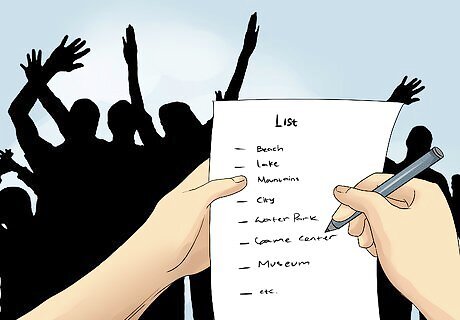
List your interests as a family. What kinds of activities do the members of your family enjoy doing as a group? Do you enjoy going on hikes together, swimming, or visiting new places? Listing some of these on a piece of paper will help you narrow down a list of potential places.Here are some common types of places to plan a vacation: A beach. The beach has a number of obvious attractions for families. Playing in the sand and rolling waves will provide hours of entertainment for your kids while you will be able enjoy lying in the sun with a great book. A lake. If you are in a more landlocked location, a lake can also provide an excellent water destination for your family. You can teach your children how to use a canoe or kayak while also enjoying the beautiful scenery surrounding the lake. The mountains. If your family loves to hike and learn more about nature, a vacation in the mountains can be a wonderful opportunity to grow closer as a family. A city. If you want to experience museums, inspiring architecture, and new restaurants, then a city can be an excellent vacation destination. A cruise. A cruise can also be a great option, especially for families, since many cruises provide shows and group activities for kids. An amusement or water park. These will be a big hit with your kids, but you should make sure you will have things to do that will interest you as well.

Define your budget. Often your budget will determine how you will pick your destination. A beach vacation in the U.S. can often be more affordable than a beach vacation in another country. Some things that you will need to budget for include: Transportation costs (airplane, train, or gas money). Be sure you factor in the price of a ticket for each member of your family. If you plan to rent a car or take taxis once you arrive, you should count this in as well. Accommodation. Hotels are a common option, but if you have a larger family, you might want to consider renting a house, condo or cabin. Food. You will probably have to account for the cost of eating out in a restaurant, but staying in a place with a kitchen will help you save money here. Entertainment. If you plan to attend amusement parks, shows, concerts, or museums, you will have to budget the cost of these tickets for your family.
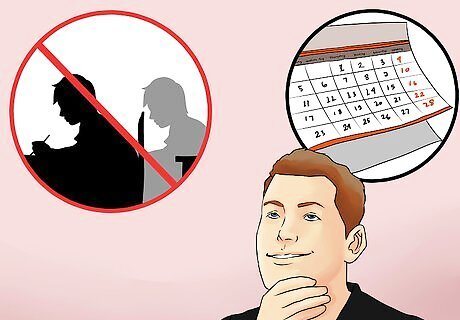
Plan for potential dates. Summer is a popular time for family vacation due to school schedules, but it is not the only option. Spring break and winter vacation are also good times to plan a vacation. Generally, the cheapest time of year to travel is in the three weeks between Thanksgiving and Christmas (the two most expensive holiday travel dates). But this can be a tricky time of year for your kids, especially if they are in high school and have final exams or end-of-year activities like holiday concerts. Make sure you clear your schedule with your children's academic calendar if you plan to travel in this period. Travel to popular destinations is cheaper when the conditions are a little less than ideal. Most places in the northern hemisphere will be most expensive during the summer. You will generally find better deals to travel to Europe in the fall or the ski slopes in the late spring because these are not the ideal times of the year to visit these places. If you plan to take to your children out in the middle of the school year, be sure to plan ahead. Talk to your children's teachers as far ahead of time as possible so you child can complete their work ahead of time. Do not plan to take your child out during a time when they have to take a standardized tests. These can be very hard to reschedule for your children. EXPERT TIP Amy Tan Amy Tan Travel Planner & Founder, Planet Hoppers Amy Tan is a Travel Planner and the Founder of Planet Hoppers, a boutique travel design team founded in 2002. Planet Hoppers specializes in brainstorming and creating itineraries for dream vacations, honeymoons, exotic adventures, family reunions, and group trips. Planet Hoppers is a TRUE accredited travel agency and a member of the Signature Travel Network, the Cruise Lines International Association (CLIA), and Travel Leaders. Amy earned a BA in Communications and a BS in Physics from the University of California, Davis in 2000. Amy Tan Amy Tan Travel Planner & Founder, Planet Hoppers Expert Trick: When you're trying to choose a destination for a family vacation, ask your friends and family if they have anywhere they'd recommend. You can also browse the internet, library, and bookstores to discover different travel destinations. If you're still not sure, talk to a travel planner who can make suggestions based on your desired experience, budget, and travel dates.
Planning the Logistics of Your Trip
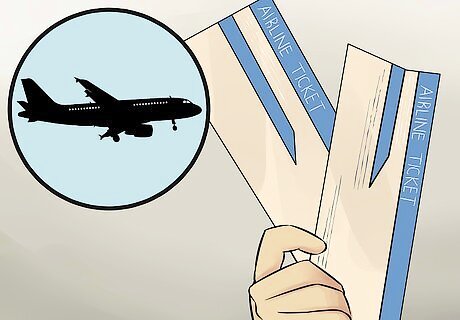
Purchase airline tickets. If you are planning on purchasing plane tickets, be sure to buy them well in advance to get the best fares. You should aim to purchase them roughly 6-8 weeks before you plan to leave. Remember that kids under two years old can fly for free, but you will have to hold them in your lap for the entire flight. Compare airfares on web sites like Kayak and Skyscanner. Comparing prices will ensure that you find the best deal at the best time. Southwest often has competitive prices, so you can check their web site for daily deals as well. Tuesday and Wednesday are generally the cheapest days to fly whereas Friday and Sunday are the most expensive. Keep in mind airline limits on luggage; most airlines limit your luggage to two checked pieces of luggage and one carry on bag per person. Encourage your children to pack lightly; the last thing you want to worry about it cumbersome luggage.

Book your accommodation. You should scout around and compare prices at different hotels. You can also find rental homes and condos on web sites like VRBO, HomeAway and AirBnB. Consider various factors in your accommodation. Is it in a central location where you can walk to different things or will you need to rent a car or take a cab? Does it have a kitchen where you can prepare meals? Check the reviews for your accommodation on-line. Does the hotel appear to be clean and safe? You might also include booking a reservation at an all-inclusive resort. These places will generally provide all your meals and drinks in the price of your accommodation so you won't have to leave the resort. EXPERT TIP Jami Yaeger Jami Yaeger Parenting Specialist Jami Yaeger is a Parenting Specialist, Doula, and the Owner of AustinBorn, an online community offering comprehensive and modern education to growing families. With 10 years of experience, Jami specializes in whole family support for pregnancy, birth, postpartum, and parenting. Jami earned her BA in Theatre Performance from San Diego State University and earned her Certification as a Lactation Education Counselor from the University of California, San Diego. She is a Certified Infant and Child CPR Instructor, Birth and Postpartum Doula, and Childbirth Educator. Jami Yaeger Jami Yaeger Parenting Specialist Ask about undisclosed family vacation discounts. When booking trips with a little one, always ask if there are special family rates for things like plane tickets, hotel rooms, entry fees, or car rentals that could save you money. Many places offer discounts but don't advertise them widely, so make sure to inquire.

Plan other activities. You may need to book other activities in advance, especially if they tend to sell out. Look into buying theater tickets, theme park passes, or tickets for sightseeing tours. Get your kids' input into what they would like to do. If your kids have time to plan and think about how they would like to spend their time, they will generally feel more involved and cooperative with the vacation. Consider if your hotel or resort provides activities for kids, like shows, games or scavenger hunts.

Get your child a passport. If you are traveling overseas by air, your child needs a passport, regardless of his or her age. If you child is under 16, you must apply for your child's passport in person at a local passport agency and you must bring your child with you, as well as supporting documentation.. The following steps are for citizens in the USA but can be used as a guide if you live in a different country: Application form DS-11, found here: https://eforms.state.gov/Forms/ds11.PDF Fill it out but don't sign it until you are at the passport agency. One 2x2 inch color photo of your child taken within the past six months. A certified birth certificate which proves your relationship to your child as well as your partner's relationship to the child. Proof of your identity and your partner's identity (like a passport or driver's license). Make two copies of each of these documents. If your child's other guardian cannot be present at the passport agency with you and your child, they must sign the parental consent form giving their permission for the child to receive a passport. If you are a single parent, you must provide proof of sole authority, such as court order granting you sole legal custody or a death certificate of your former spouse if you are a widow. $120 for the passport application fee for a minor (under 16) and the expediting fee to process the application. Passport agencies will accept credit cards, debit cards, check, money orders and cash in exact change.
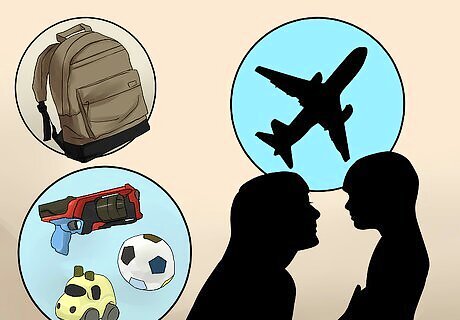
Travel to your destination on an airplane. Half the battle of vacation is arriving at your destination. This can be tricky, especially if you have kids. For airline travelers, prepare as much as you can in advance. Print your boarding passes out at home so you do not have to stand in an extra line at the airport before checking your bags. Discuss with your kids ahead of time what it will be like to go to the airport, especially if it is their first time flying or they don't remember flying as an infant. Explain that they will have to take off their shoes and any jackets when they go through security. They will need to put their bags and any toys into bins and push them through the conveyor belt at security. Discuss how it will be crowded at the airport and they need to remain by your side at all times. Use a backpack for your carry-on item. A backpack will keep your hands free as you go through the airport, making it easier for you to keep your children close to you. Prepare for security. If you are traveling with a car seat or stroller, these will both need to go through security and there is a likelihood that you will need to check this at the gate of your flight, as opposed to keeping them in your overhead bin on the plane. Remember that the TSA's 3oz limitation on liquids, gels and aerosols for carry-ons does not apply to breast milk, baby food or formula. You can pack as much of these as you need to get to your destination. Bring toys and games to keep your kids occupied. Great portable toys include coloring books, stickers, magnets, and games that don't require small pieces. Make sure your kids know that the must listen to their headphones or mute the sound on any electronic device that they use during the flight. Make sure you pack plenty of snacks to take on the flight such as nuts, dried fruit, and Cheerios. While you won't be able to bring bottles of water with you to the airport, you should purchase a bottle in case your kids get thirsty or drink more than any complimentary drinks served on the flight.

Drive to your dream vacation. For closer destinations, you might find it easier and cheaper to drive than to fly. But driving can take a toll on even the best behaved kid. Here are some tips for keeping your kids occupied during a long drive: Plan strategic stops. Make everyone goes to the bathroom before you all get into the car, even if they don't think they need to. From there, you should plan to stop every couple hours to accommodate the diverse bladder needs of all passengers. If you have a short road trip, try to plan your departure around your child's sleeping schedule. For instance, if they normally take a nap right after lunch, try leaving at around the same time. Your child will most likely spend the majority of the trip sleeping. Keep your documents organized. On a road trip, you should keep all relevant documents together, including maps, hotel or camping reservations, pamphlets for sightseeing stops, a list of potential restaurants to stop at. You can keep everything in a binder under your seat. Give your kids a surface to work with. Bring along a cookie tray or small lap desk for each child so they can draw with coloring books and crayons, play with puzzles or blocks, toys, etc. This will help keep them occupied. Plan a scavenger hunt. If you are planning on stopping at a few different sites while on the road, give your kids a scavenger hunt for each stop. Find pictures on-line of things at each site (like a statue, a particular building, or a famous tree), print them out, and then give them to your kids to find. Reward your kids for good behavior. Before you embark on your journey, bring a few rolls of different coins -- quarters, nickels, dimes -- and give them to your kids whenever they do something good, like sharing a toy with their sibling or when they finish reading a book. That money can then be used for them to buy a souvenir at their destination. Consider giving them glow-in-the-dark toys to use when you travel in the car at night.
Enjoying Your Vacation
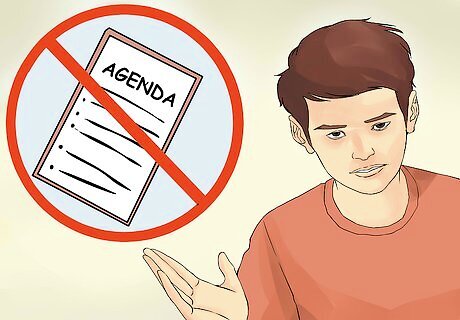
Keep an open schedule. Once you have arrived, try to not over plan your days. Aim to complete just one or two major activities or outings every day (like going to a zoo or aquarium). The number of activities you do will depend on your kid's age and stamina, but don't cram too many things into one day. You should budget plenty of relaxation time between sightseeing or other physical activities. Remember that the hottest hours of the day during the summer are from 10:00am-2:00pm. These might not be the best times for your kids to do very strenuous outdoors activities (like hiking or running). Keep an open, flexible mind. If your children become irritable or cranky, don't force them to do an activity simply because it was on the agenda.

Build memories with your family. Ask your kids to collect memorable items from your trip such as ticket stubs, candy wrappers from their favorite sweet shop, sea shells, even a little jar of dirt or sand from your favorite beach.

Allow for different group activities. As a family, you might feel compelled to do all the same activities together. But you should feel open to breaking up into groups based on different interests. For example, if you and your daughter would like to go shopping, but your spouse and son would like to take a surfing lesson, then you should feel alright about breaking apart for a short time.

Plan for quality couple time. If you would like to enjoy a nice dinner out with your spouse, many hotels offer baby sitting services that you can use for your date night. If you travel with another couple and their kids, you can also switch off baby sitting duties.




















Comments
0 comment